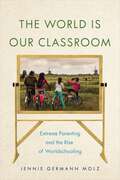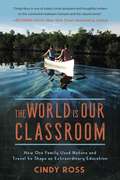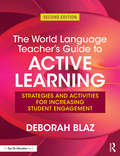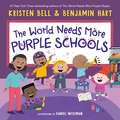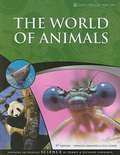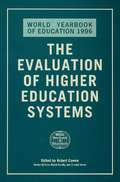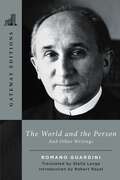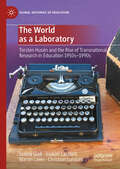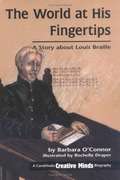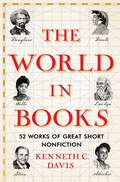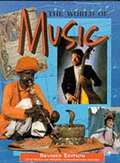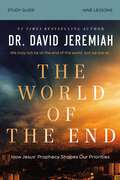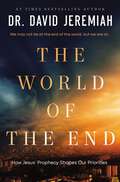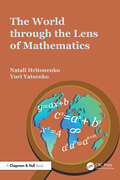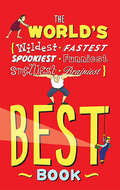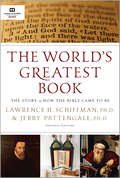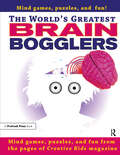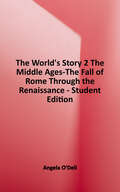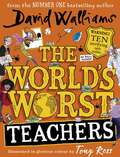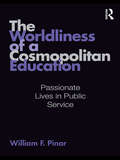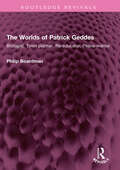- Table View
- List View
The World Is Our Classroom: Extreme Parenting and the Rise of Worldschooling (Critical Perspectives on Youth)
by Jennie Germann MolzHow travelling the world allows new ways to educate children and perform family life on the move A growing number of families are selling their houses, quitting their jobs, and taking their children out of traditional school settings to educate them while traveling the globe. In The World is Our Classroom, Jennie Germann Molz explores the hopes and anxieties that drive these parents and children to leave their comfortable lives behind out of a desire to live the “good life” on the move.Drawing on interviews with parents and stories from the blogs they publish during their journeys, as well as her own experience traveling the world with her ten-year-old son, Germann Molz takes us inside a fascinating life spent on trains, boats, and planes. She shows why many parents—disillusioned with standard public schooling—believe the world is a child’s best classroom. Rebelling against convention, these parents combine technology and travel to pursue a different version of the good life, one in which parents can work remotely as “digital nomads,” participate in like-minded communities online, and expose their children to the risks, opportunities, and life lessons that the world has to offer.Ultimately, Germann Molz sheds light on the emerging phenomenon of “worldschooling,” showing that it is not just an alternative way to educate children, but an altogether new kind of mobile lifestyle. The World is Our Classroom paints an extreme portrait of twenty-first century parenting and some families’ attempts to raise global citizens prepared to thrive in the uncertain world of tomorrow.
The World Is Our Classroom: How One Family Used Nature and Travel to Shape an Extraordinary Education
by Cindy RossCindy's story begins in the Rocky Mountain wilderness on a unique and extraordinary journey: two parents leading their young children 3,100 miles on the backs of llamas. This Canada-Mexico trek illustrated to Cindy and her husband what experiential education can do. Inspired by the experience, they went on to create a new way of supplementing their children?s education, focusing on two arenas for learning: the natural world and travel. In this age of world connection, it is important to raise broad-minded and empathetic children who are knowledgeable about other cultures. To accomplish this goal, Cindy chose an unorthodox approach: she orchestrated learning opportunities for her children, Sierra and Bryce, in twelve countries. The family traveled the world, moving about on foot and bicycle, living simply and intimately. But just as important, and more accessible for many parents, were the opportunities for learning closer to home. These adventures brought intangible gifts: values--such as compassion, empathy, resilience, self-reliance, and gratitude, among others--not always fostered in a traditional curriculum but crucially important to raising children. By sharing her story, along with honest insights from her children about the importance of their unusual education, Cindy aims to empower parents to believe they can be their children's best and most important educators. It is for parents who are seeking inspiration, who love a good story, and who are looking for an unorthodox way to raise the happiest, healthiest, and brightest children they can.
The World Language Teacher's Guide to Active Learning: Strategies and Activities for Increasing Student Engagement
by Deborah BlazEnhance your students’ success and improve the likelihood of retention with the easy-to-implement activities and strategies in this book! Bestselling author Deborah Blaz shows how to create a classroom in which students can actively experience, experiment with and discover a world language. The new edition features updated strategies based on brain-based research and new ideas for using technology and personalized learning. In addition, the book has been reorganized to help you easily find and pull activities you want to use in your classroom the very next day. You’ll learn how to… mix up your repertoire of activities, games, and exercises to keep students engaged; introduce students to the culture of the language you teach by hosting parties and celebrations; overcome some of the biggest obstacles in the path to fluency, including verb conjugation, using object pronouns, and the subjunctive mood; customize your teaching strategies to accommodate a broader range of talents, skills, and intelligences; implement new assessment strategies to improve verbal skills and reading comprehension; and more! Bonus: Downloadable versions of some of the resources in this book are available on the Routledge website at www.routledge.com/9781138049574, so you can print and distribute them for immediate classroom use.
The World Needs More Purple Schools (My Purple World)
by Kristen Bell Benjamin HartIt's back to school with Kristen Bell and Benjamin Hart! Learn how to paint your school purple with this follow-up to the #1 New York Times bestseller The World Needs More Purple People.Penny Purple taught us how to be a purple person. A person who finds common ground with others while celebrating what makes them unique! Now Penny and her pals will put their purple skills into action in their very favorite place -- their classroom! How do you make a purple school? It will take curiousity, sharing, hard work, and lots of laughs!
The World Of Animals (God's Design For Life)
by Debbie Lawrence Richard LawrenceYou will explore every facet of the animal kingdom in this book. From cuddly mammals and slimy frogs, to jellyfish and bacteria, you and your child will discover how God created each animal to be unique. The activities make learning about animals even more fun.
The World Yearbook of Education 1996: The Evaluation of Higher Education Systems (World Yearbook of Education)
by Robert CowenThis annual summary of educational policies and practices worldwide includes discussion of multi-skills and flexibility, school-work links, qualifications, and education for skills versus education for status.
The World and the Person: And Other Writings
by Romano GuardiniNo Catholic library is complete without these five landmark works by Romano Guardini, one of the most important Catholic figures of the 20th century.This treasury brings back into print Regnery's classic translations by Stella Lange with a new introduction by Robert Royal: The World and the Person, The Church of the Lord: On the Nature and Mission of the Church, The Word of God: On Faith, Hope, and Charity, The Virtues: On Forms of Moral Life, and The Wisdom of the Psalms. From the Introduction by Robert Royal: The present collection is a highly valuable retrieval of texts that supplement Guardini's greatest and best-known books, such as The End of the Modern World, The Spirit of the Liturgy, and The Lord, which have remained in print and have influenced generations. He makes a point of calling the works in this collection "reflections," not systematic treatments. But in truth they "reflect" the author's deep and internally consistent theological, philosophical, and—unusual among religious writers—literary culture. His books on Dante and Rilke, along with his frequent references to Augustine, Pascal, Dostoyevsky, Heidegger, and even Nietzsche, present an eclectic but deep and coherent vision of the Church and the world. Varying approaches to fundamental questions, of course, have their advantages and disadvantages. But as these texts make abundantly clear, Guardini had the kind of mind—the living virtue, as he puts it in his book on the virtues, included here—that can move flexibly but faithfully through whatever questions it encounters. Which is why these books are less like academic treatises and more like living dialogues with a wise and experienced and learned friend.
The World as a Laboratory: Torsten Husén and the Rise of Transnational Research in Education 1950s–1990s (Global Histories of Education)
by Martin Lawn Sotiria Grek Joakim Landahl Christian LundahlThis book covers the construction of international education research community in the 1950s-1990s, and the growth of its ‘disembedded’ laboratory i.e. networks, spaces, materiality, travelling, translations. The book follows a sociology of science theoretical framework in order to examine the research-archive of the Swedish internationally renowned educational scholar Torsten Husén (1916-2009). The archive reveals the shifting and heterogenous transnational networks that contribute to the development of social science research beyond fixed time and space dimensions, and that extends social science beyond individual ideas, researchers, environments, institutions and universities. These are practices that create, mobilise, sustain and challenge relations between actors in innovations, knowledge creation and various social activities. In other words, the archive represents the socio-material manifestation not only of the intellectual trajectory of a key education actor but the growing organisation of a whole scientific field at the time.
The World at His Fingertips a Story about Louis Braille
by Barbara O'ConnorAlthough this is a children's book, it is written in a style that will appeal to adults, as well. It is an interesting and very informative biography of Louis Braille, and includes a bibliography for further reading.
The World at His Fingertips: A Story About Louis Braille
by Barbara O'Connor<P>A short biography of Louis Braille. This book is written for children and does a good job of covering the highlights of Braille's life. <P>An excellent book for a book report or as a reference for a term paper. For grades 3-9 and older readers.
The World in Books: 52 Works of Great Short Nonfiction (Great Short Books)
by Kenneth C. DavisA delightful, inspiring, and idea-rich selection of fifty-two of the best, most important short nonfiction works of all time—from Plato to Michael Pollan and Dante to Joan Didion—chosen by historian, lifelong reader, and bestselling author of Don&’t Know Much About History.From ancient times to the present day, The World in Books offers a wide-ranging historical education through pleasure reading—and a fantastic introduction to some of the most thought-provoking, profound, and interesting nonfiction works of all time. From Sun Tzu&’s The Art of War to bell hooks&’s All About Love, as well as such recent classics as Barbara Ehrenreich&’s Nickel and Dimed and Chimamanda Ngozi Adichie&’s We Should All Be Feminists, Davis&’s guide suggests a world of nonfiction books and explains just why they&’re so historically meaningful and culturally relevant today. The perfect guide for the modern-day reader, these fifty-two selections provide an ideal way to explore some of the most enduring, influential books ever published, introducing us anew to world-shaping historical figures, events, and ideas.
The World is My Classroom
by Joanne Benham Rennick Michel DesjardinsInternational education and learn-abroad programs have received heightened interest in the knowledge economy, and universities are keen to create successful programs for students. The World Is My Classroom presents diverse perspectives on these experiential learning programs and ways of globalizing Canadian classrooms. Examining themes such as global education, global citizenship, and service learning, it sheds light on current debates that are of concern for faculty members, administrators, international partners, and students alike.The World Is My Classroom is the first book to examine pedagogical questions about the internationalization and globalization of higher education from an explicitly Canadian perspective. It features original reflections from students on their experiences in learn-abroad programs, as well a foreword by Craig and Marc Kielburger, founders of Free the Children and Me to We, on the benefits of international learning experiences. Universities considering developing, enhancing, and refining their learning abroad programs, as well as students considering these programs and experiences, will find this an insightful and useful book.
The World of Music
by Nicola Barber Mary MureIntroduces musical instruments and music from around the world and chronicles the history of music in the Western world from 1100 to the present.
The World of the Beaver
by Leonard Lee Rue III"According to a Cherokee legend," writes Leonard Lee Rue in The World of the Beaver, "it was the Great Spirit, with the help of gigantic beavers, who created the earth. The earth had been covered with water until the Great Spirit sent the beavers diving down beneath the surface to dredge up mud from the bottom to form land masses." Although the beaver is not, nowadays, as big as his legendary ancestors, he continues to be enormously helpful to man and beast. Here Leonard Lee Rue reveals the world and way of life of the good -natured, industrious American beaver and follows him through a full year of his ordinary activities. How does a beaver fell a tree? What does he eat? Is he polygamous or monogamous? How does he build a dam? What does the inside of his lodge look like? Who has been his most deadly enemy in America? The author-whose interest in beavers has caused him to go swimming with them and, on one occasion, led to his becoming stuck in the passage to a lodge-answers all these questions and many others. The informal narrative and the author's remarkable photographs make this really first-rate reading for the nature student and for the ordinary reader. "As intent as man seems to be on destroying the earth," writes Leonard Lee Rue in conclusion, "the Creator may again have to call upon the beavers to help patch things up. The earth's future couldn't be in better paws."
The World of the End Bible Study Guide: How Jesus’ Prophecy Shapes Our Priorities
by Dr. David JeremiahThis Is Our Time to Be the AnswerSome days it seems like bad news all around. And with bad news comes questions: &“Why is this happening?&” &“When will it stop?&” &“What can we do?&” And most pressing of all: &“Is this the end?&”In these hope-filled pages, bestselling author, pastor, and respected Bible teacher Dr. David Jeremiah will help you focus your mind on the hand of God instead of the problems at hand. Jesus Himself revealed what to expect from this season of history when He delivered His Olivet Discourse—a sermon that scholars have called &“the most important single passage of prophecy in all the Bible.&”This study guide, designed for use with Dr. Jeremiah&’s book The World of the End, focuses on Jesus&’ prophecy in Matthew 24. Jesus makes it clear that all the signs He points to won&’t occur at once; instead, they will gradually appear and become stronger and more frequent. You will learn exactly what Jesus promised to us—and what He expects of us—as we approach the World of the End.Each lesson includes:An outline of the main subjects and Scriptures covered during the lessonAn overview of Dr. Jeremiah&’s teaching on the topic being studiedApplication questions to help both individuals and small groups delve into the content and the BibleA Did You Know? section that adds a point of interest to the lesson
The World of the End: How Jesus' Prophecy Shapes Our Priorities
by Dr. David JeremiahIn a world that seems to be spinning out of control, we need hope more than ever. What if the life sustaining hope you need is found within the pages of the Bible?Join New York Times bestselling author and trusted Bible teacher, Dr. David Jeremiah's as he unpacks the scriptures to reveal that the problems we are facing is to be expected, and in fact will increase as we draw closer to the End Times. But even more importantly we should not worry since Jesus has overcome the world. And because of this there is hope for this life, but more importantly for the next.Learn how:The Bible has already laid the foundation on how we can live victoriously, even in difficult timesJesus not only calls Christians to a higher standard, but equips us with the tools and strength we need to confidently follow him dailyAnd explore the gospels more closely to find the comfort you need to trust God is in control and that his plan is still working to completionGrow your faith, by going deeper, with Dr. David Jeremiah.
The World through the Lens of Mathematics
by Natali Hritonenko Yuri YatsenkoHundreds of meticulously crafted mathematical problems and puzzles in this book are incorporated into fascinating stories about our world. These wor(l)d problems are grouped by their mathematical concepts such that the titles of sections and chapters combine both mathematical and applied terms, hinting at the topics covered. Detailed solutions conclude each section. Following in the success of the authors’ previous book, USA Through the Lens of Mathematics, this text contributes to the novel pedagogical call for a more multidisciplinary approach in education. The various types of questions posed in The World through the Lens of Mathematics are stimulating, entertaining, and educational. Their main objective is to provide a thorough review of the fundamental concepts of algebra and geometry, reduce mathematical anxiety, and emphasize the applicability and versatility of mathematics. Working these problems shatters the barriers between the students and mathematics by encouraging them to look at the subject from a different perspective. Students are simultaneously enriched with new knowledge of historical events, customs, and geography of countries around the world, each one of which is mentioned throughout the pages of this book.
The World's Best Book: The Spookiest, Smelliest, Wildest, Oldest, Weirdest, Brainiest, and Funniest Facts
by Jan PayneWith all of the books in the world, this one is the best! With a multitude of did-you-knows, accompanied by hilarious illustrations, page after page is packed with the best entertainment and education. For kids craving to jam their brains with odd and intriguing facts, here's a banquet-stuffed with the fastest, brightest, longest, funniest, weirdest, wildest, wettest, smelliest, brainiest, and fascinating-est things in the world!
The World's Biggest Classroom (Fountas & Pinnell Classroom, Guided Reading Grade 4)
by Alicia FenwickAn Unusual School Australia is a HUGE country. Many families live in remote areas, far apart from one another. So how do the children in these families go to school together? NIMAC-sourced textbook
The World's Greatest Book: The Story of How the Bible Came to Be
by Lawrence H. Schiffman and Jerry PattengaleWelcome to the fascinating story of how we got the world's greatest book -- the Bible.It is a captivating story that includes a little bit of everything: adventure and violence, mystery and bravery, and dumb luck or divine intervention -- depending on your point of view.How in the world did we get this book that some people swear by and other people swear at? You don't have to be a skeptic to have a grocery list of questions about the formation of the Bible, such as: Who wrote these documents and when? How were these ancient writings transmitted through the ages? As scribes made copies of copies, didn't they make mistakes that caused the ancient writings to be changed and corrupted? How was it decided which writings would be included in the Bible? What are the Dead Sea Scrolls, and why are archaeological finds like these such a big deal?Devoted people dedicated their lives throughout time to put this unique book into the hands of people worldwide. Retrace the passion and intrigue behind the Bible's creation.
The World's Greatest Brain Bogglers: Grades 3-9
On January 1st, a girl said to a boy, "Two days ago, I was 7, but next year I'll be 10." She was telling the truth. Try to figure out how this could be possible.―Pamela Massey, 12What do you have when you are sitting down that disappears when you stand up?―Lindsay Lingerman, 12Your students will love these collections of games, puzzles, logic puzzles, word finds, riddles, and mazes―all by kids just like them! Each puzzle or game is by a kid, because these challenges are collected from the pages of Creative Kids, a magazine by and for kids―so you know that the brain bogglers in these collections will be perfect for your students. Sit back as your students use logic to create a mismatched monster, decrypt secret messages, and solve picture puzzles.Filled with hours of fun and challenge, there is something for everyone in these books, from corny riddles, to perplexing crosswords, to complicated puzzles―all written by kids, but challenging for any age.
The World's Story 2 The Middle Ages-The Fall of Rome Through the Renaissance - Student Edition
by Angela O'DellAngela O’Dell’s World’s Story series uses the same fun style of her popular America’s Story series to teach junior high students about world history. Students will learn about everything from the fall of Rome to the Renaissance in a survey that covers Europe, Asia, Africa, and the Americas. Written from a strong Christian perspective, students will see God’s hand throughout history and learn about how this history is still relevant to their lives today.
The World's Worst Teachers
by Tony Ross David WalliamsMillions of young readers have loved the World’s Worst Children tales – now they will revel in this delightfully dreadful collection of the most gruesome grown-ups ever: The World’s Worst Teachers. From the phenomenally bestselling David Walliams and illustrated in glorious colour by the artistic genius, Tony Ross. Think your teachers are bad? Wait till you meet this lot. These ten tales of the world’s most splendidly sinister teachers will have you running for the school gates. Dr Dread teaches science and is half man, half monster… Watch out for the ghastly Miss Seethe. She is ALWAYS furious – and she’s on a detention rampage. And as for Pent, he’s a teacher with a real difference. He is bone-shakingly terrified of… children! Millions of children have loved the World’s Worst Children – now they will revel in this delightfully dreadful collection of the most gruesome grown-ups ever, The World’s Worst Teachers. Brought to you by number one bestselling author, David Walliams, with every story illustrated in glorious colour by artistic genius, Tony Ross.
The Worldliness of a Cosmopolitan Education: Passionate Lives in Public Service (Studies in Curriculum Theory Series)
by William PinarPinar positions himself against three pressing problems of the profession: the crime of collectivism that identity politics commits, the devaluation of academic knowledge by the programmatic preoccupations of teacher education, and the effacement of educational experience by standardized testing. A cosmopolitan curriculum, Pinar argues, juxtaposes the abstract and the concrete, the collective and the individual: history and biography, politics and art, public service and private passion. Such a curriculum provides passages between the subjective and the social, and in so doing, engenders that worldliness a cosmopolitan education invites. Such worldliness is vividly discernible in the lives of three heroic individuals: Jane Addams (1860-1935), Laura Bragg (1881-1978), and Pier Paolo Pasolini (1922-1975). What these disparate individuals demonstrate is the centrality of subjectivity in the cultivation of cosmopolitanism. Subjectivity takes form in the world, and the world is itself reconstructed by subjectivity’s engagement with it. In this intriguing, thought-provoking, and nuanced work, Pinar outlines a cosmopolitan curriculum focused on passionate lives in public service, providing one set of answers to how the field accepts and attends to the inextricably interwoven relations among intellectual rigor, scholarly erudition, and intense but variegated engagement with the world.
The Worlds of Patrick Geddes: Biologist, Town planner, Re-educator, Peace-warrior (Routledge Revivals)
by Philip BoardmanFirst published in 1978, The Worlds of Patrick Geddes is a study of Patrick Geddes’ thought and action, his relationships and his life, as someone who defied labelling and who was years ahead of his contemporaries. The work of Patrick Geddes (1854-1932) is coming to be more and more widely appreciated, as his ideas on many diverse subjects are being gradually assimilated into the mainstream of modern thought. Geddes has been confidently labelled as a biologist, town-planner, sociologist and educator; but he was all of these and more. This book will be of interest to students of biology, urban planning and sociology.
